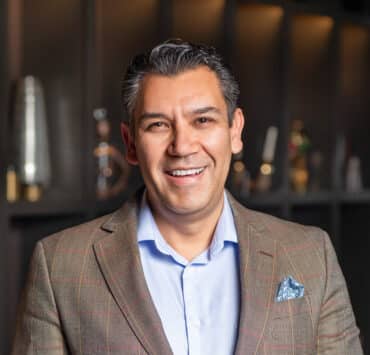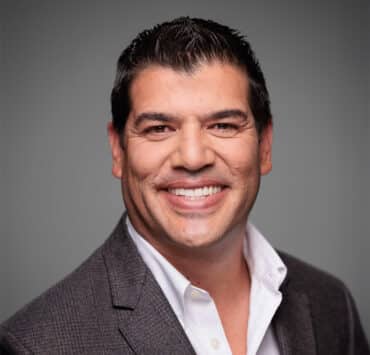|
Getting your Trinity Audio player ready...
|
Alejandro Saenz loves a challenge. In fact, the only thing he enjoys more is discovering an unexpected opportunity. His two passions often go hand in hand.
Today, Saenz is the vice president of digital transformation at Harris, a leading mechanical contractor founded in 1948, and one of ENR’s top 10 mechanical contractors nationwide. The company’s end-to-end building systems power hospitals, stadiums, education facilities, data centers, federal, semiconductors, manufacturing, and other major structures, including the Las Vegas Sphere.
When Saenz joined the organization in 2020, he did so for the chance to do what he’s always done—solve problems and seize the moment. “Companies never fill a leadership position because things are perfect. They hire leaders who can contribute and offer something new,” he says.
What Saenz offered was a new way forward. During a period of rapid expansion, Harris needed to upgrade its financial and operational infrastructure. This was a great opportunity for Saenz to build a foundation for future innovation that would enable Harris to continue to transform and scale its operations.
The new digital transformation leader got to work. He sought out experts in the internal subject matter, recruited new team members, and collaborated with external advisors to secure approval for a multimillion-dollar investment. He executed the implementation of modern customer relationship management (CRM), enterprise resource planning (ERP), and field service management (FSM) systems.
Then, with the new systems up and running, Saenz set his sights on the next phase—industrialized construction, which is the combination of manufacturing and building practices. “The construction industry is lagging in terms of innovation and technology,” he says. “Some players are finally implementing positive steps on a project level, but we are planning to take these methods to our entire business.”
“Companies never fill a leadership position because things are perfect. They hire leaders who can contribute and offer something new.”
Alejandro Saenz
At Harris, industrialized construction is all about harnessing the power of productization, automation, and technology to transform business processes, increase efficiency, decrease costs, and drive positive outcomes. Saenz created an industrialized construction group, as well as a business automation and intelligence unit to help drive change. These teams, comprised of business analysts, project managers, data scientists, software developers, and others, will leverage modern tools to transform the technological and business landscape at Harris.
As these efforts get underway, Saenz is careful to ensure that they are adopted company wide. “The goal is to make industrialized construction tangible for everyone and scalable to the entire organization,” he says.
Currently, Saenz and his team are busy using advanced technology at manufacturing facilities to help team members better leverage building information modeling data and 3D models. The results of these pilots have been positive and have improved the automation of manufacturing machinery such as plasma cutters, laser cutters, and other tools used to fabricate mechanical systems.
Saenz can’t remember a time when he wasn’t fixated on doing things faster and better than everyone else. Now, he lives near West Virginia’s Blue Ridge Mountains, but Saenz grew up in the Guatemalan Highlands as one of five boys in a lively household.
The Saenz children witnessed sacrifice, service, and hard work. Their father took factory and construction jobs, often commuting to the United States for eleven months out of each year. Although he didn’t own a car, he never complained about having long commutes and often found creative ways to help others. Saenz’s mom served her community as a teacher. Faith was central to the family.
By the time Saenz was ten, his family had moved to the United States after receiving permanent residency status. Even as they were learning English and adapting to a new environment, the Saenz family still found time to practice their faith and serve those around them. At age fourteen, Saenz himself found work as a waiter at a retirement home and started taking architecture and engineering classes in high school. Two years later, he interned at a steel manufacturing company.
“The goal is to make industrialized construction tangible for everyone and scalable to the entire organization.”
Alejandro Saenz
Before joining Harris in 2020, Saenz spent the early part of his career building his skills in construction operations and technologies at various companies. He also learned an important lesson about being prepared for all opportunities. When he was twenty-three, Saenz’s performance was so exemplary, he was offered the chance to work on a high-profile project for the United States government. However, since Saenz hadn’t applied for US citizenship, he couldn’t take the job. That missed opportunity is something he still thinks about today.
“We all need to make sure we are prepared for whatever may lie ahead,” Saenz says. “As a leader, it’s now my job to push my team to be ready so they don’t miss out on something special.”
Saenz went to work for a construction company where he learned post-tension systems. He then rounded out his skills by looking for roles first in structural engineering, and later in mechanical engineering and construction. Prior to joining Harris, Saenz spent nearly thirteen years at another national mechanical design-builder and ENR top 10 mechanical contractor. While there, Saenz helped lead and support some of the largest projects in the nation. He also introduced three corporate groups focused on design, fabrication, and construction technologies. Those groups supported the organization’s annual revenue growth from $300 million to $1.2 billion.
While he was building those new groups, Saenz found time to return to school. He completed a computer information technology major with a minor in business management at Brigham Young University in Idaho. When not leading advancements and innovation, he volunteers with his church and helps organize humanitarian aid and social service programs for local nonprofit organizations.
While his responsibilities at Harris don’t leave a lot of time for giving back, Saenz is not about to start backing away from a challenge. “I’ve tried to uphold the faith-based and service-oriented values that my parents instilled in all of us,” he says. “Life encompasses more than just our individual achievements; it is our responsibility to lift those around us.”

